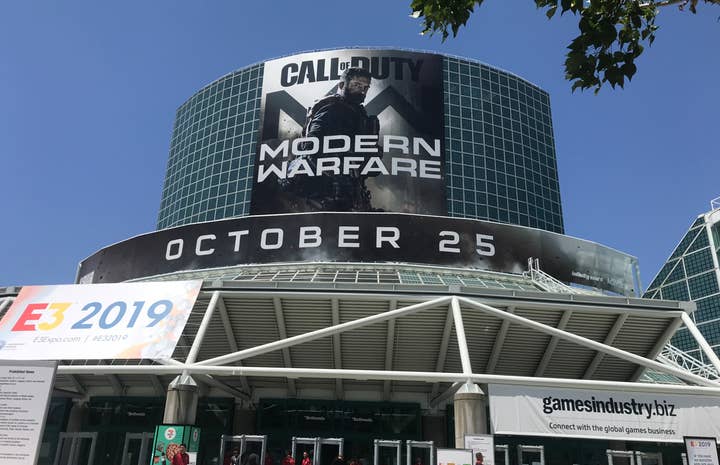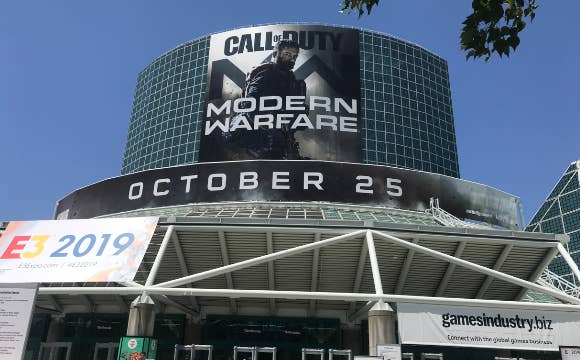How do you solve a problem like E3? | Opinion
In 2023, ReedPop is tasked with bringing E3 back to the Los Angeles Convention Center. Here's what we're up against
A little while ago, ReedPop's VP of gaming Kyle Marsden-Kish asked me if I'd like to help with E3.
The news is out that ReedPop -- the folks behind PAX, EGX and New York Comic-Con (amongst others) -- is handling the running of E3 2023. They're also the company that operates GamesIndustry.biz, and so it wasn't a surprise that they asked for our input.
I've always loved E3. I did as a teenager, when I'd spend all-night discussing the news on forums, before rushing out to buy all the games magazines to read what the journalists thought. And I do now as an adult, only this time I am writing the reports, and discussing the news at the Marriot bar instead.

Therefore you'd think I'd jump at the chance to get involved. But it wasn't an immediate yes. Because although I love E3 and I will be first on the plane to LA next year, working on it is an entirely different matter.
E3 is a challenged show. It's an event in transition, much like the rest of the games industry, and everyone has different views on what it should be. There are those that think it should be a complete business show, with quieter halls, places to meet and connect, good internet and plenty of food and drink. There are those who think it should embrace the fans and open the doors fully to the public. Perhaps even mimic the Gamescom model with its business and consumer areas.
E3 is a challenged show and everyone has different views on what it should be
And then there are those that think it should just go away. A relic from a bygone era, when people bought games in physical shops and got their news from printed media.
I never really prescribed to that last one. Although E3 began as a trade show in 1995, that wasn't why it was put together. There were plenty of shows where publishers could put their games and consoles in front of retailers, and the biggest one at the time was CES. The real reason, or so I was told by those who were there, was because they felt video games deserved their own moment. I still believe that's true.
Yet E3 undoubtedly has questions to answer, and criticism to react to. How do you make the event good for consumers, when so many of the games are behind closed doors? How do you bring in fans and improve the experience for business attendees at the same time? How do you make it more accessible to more developers, and not reliant on an increasingly consolidating number of AAA publishers? How do you expand beyond the console industry and engage more with mobile and PC? How do you regain the trust of attendees and exhibitors who have decided it's not for them?
And how do you make it a fully inclusive event that celebrates and unites the games industry? Whenever the event ends, I'm often asked 'Who won E3?' It's a fun question to answer as a journalist, but not as an event organiser. Because if the answer isn't 'everybody', you've probably not done a good enough job.
Those are hard, maybe even impossible, questions to answer. So you could see why I might be reluctant to get involved.
But then I had a few Zoom calls with some of the people deciding what's next for E3. These included people from across the company and outside of it, too, such as former PAX content director Guy Blomberg, who has returned to help with the project. We spent hours discussing what the show could be, and suddenly I got excited.
We were throwing around ideas about how we could get those consumer and business elements to work. We talked about what we could offer those companies not interested in big booths. We dreamed up ways we could make the event more of a celebration, and less like a battleground. They had thought about it all.
Some of the ideas are too ambitious to pull off in one year. But we can certainly give it a try
We discussed ways to embrace everything that takes place during E3 week... whether they're part of the show floor or not. And that includes things like the PC Gamer Show, and Devolver Digital's car park, and yes, Geoff Keighley's Summer Games Fest. Because to those watching at home, all of that is E3. To most people, the event isn't two halls in Downtown LA, but it's the showcases, the reveals and the video games. E3 is more than an expo, it's an idea, and one that's bigger than ReedPop and the ESA. There's no use fighting against that.
That desire to unite the industry, irrespective of whether they're part of the show or not, extends around the world, too. E3 is already a global event, and we want to take that further.
Some of the ideas are too ambitious to pull off in one year. But we can certainly give it a try.
Of course, it's possible that people have already made their mind up about E3. Perhaps all of this is a little too late. And when my bosses come back from meeting all the big games companies (with a presentation that will inevitably get leaked), perhaps we'll hear how everyone was indifferent, and it's just not what the industry is looking for.
But I hope not. I hope they'll sign up and come back, so that together we can make E3 2023 a week to remember.
How could I say no to that?

